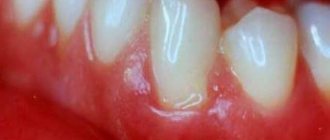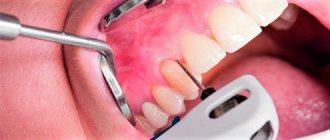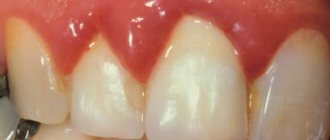Stomatitis in a pregnant woman: types, causes, symptoms
In medicine, stomatitis refers to inflammatory processes in the oral mucosa. The disease can be caused by local and systemic factors. This disease affects the mucous membrane of the cheeks, lips, tongue, palate, and gums. The mechanism of the disease is still not studied. Scientists suggest that it is based on immune processes.
The oral mucosa is the initial section of the digestive tract, protects the body from the effects of pathogenic microorganisms, and participates in thermoregulation processes. The main role in maintaining local immunity is played by leukocytes contained in saliva. When the mucous membrane is infected, their number increases.
In medicine, this disease is classified based on the manifestation of symptoms and provoking factors. In diagnosis, the following types of stomatitis are distinguished:
- aphthous, in which small ulcers with a bright red border appear on the mucous membrane;
- herpetic, characterized by the appearance of small blisters in the oral cavity in the form of a rash, which subsequently burst and become ulcers;
- angular, in which slit-like erosions (jams) appear in the corners of the mouth;
- catarrhal, which is characterized by sensations of dryness, burning, loss of taste, pain when eating food;
- allergic;
- bacterial;
- viral;
- fungal;
- vesicular;
- traumatic.
Photo gallery: types of stomatitis according to external manifestations
With catarrhal stomatitis, inflammation of the oral mucosa occurs without the occurrence of ulcers
Aphthous stomatitis is characterized by pronounced ulcers on the oral mucosa
With angular stomatitis, slit-like erosions (jams) appear in the corners of the mouth
Symptoms
Symptoms for each type of stomatitis are different. In the general approach, the disease begins with redness of the mucous membrane, resulting in swelling, itching and burning. In some cases, general health may deteriorate, the temperature may rise, and headaches may occur. With further development of the disease, round or oval ulcers covered with a white film appear at the site of the lesion.
The acute stage of stomatitis is often accompanied by the following additional symptoms:
- severe pain in the mouth that limits the function of the lips and tongue, making it difficult to drink and eat;
- increased salivation;
- bleeding from the gums;
- enlarged lymph nodes;
- bad breath.
Causes
According to medical research, in most cases, stomatitis in pregnant women develops due to the following factors:
- decreased general and local immunity;
- lack of vitamins and minerals in food;
- hormonal changes;
- infectious diseases;
- gastrointestinal pathologies;
- dental diseases.
Recurrent aphthous stomatitis is a disease characterized by decreased immunological reactivity and impaired nonspecific defense. The development of which is caused by foci of chronic infection in the body (tonsillitis, chronic tonsillitis, pharyngitis, diseases of the gastrointestinal tract, etc.), as well as the influence of a number of unfavorable factors (chronic stressful situations, frequent changes in climate zones, occupational hazards, etc.).
E.V. Borovsky
"Therapeutic dentistry"
As a result of a decrease in the body's defenses, the mucous membrane can be affected by viruses, bacteria, and fungi. These microorganisms begin to multiply intensively when the oral cavity is damaged: burns, injuries, bites. Cooling or overheating of the body leads to disruption of thermoregulation, causing dry mouth. As a result, the protective properties of the mucous membrane are reduced and opportunistic bacteria begin to multiply uncontrollably.
Some studies have found a relationship between an increased risk of stomatitis and hormonal changes during pregnancy. Statistics also show that the oral cavity is affected more often during periods of mental and emotional stress. Most often, pregnant women are diagnosed with viral stomatitis, primarily caused by herpes simplex. The herpetic form of the disease can be either primary or recurrent. In the first case, the symptoms are more pronounced.
The growing fetus takes vitamins and minerals from the mother's body. As a result, their deficiency may occur. The appearance of stomatitis in a pregnant woman may indicate a lack of B vitamins and folic acid in the body. In nine cases out of ten, angular stomatitis develops with iron deficiency anemia and is caused either by streptococci or fungi of the genus Candida.
Insufficient oral care, untreated dental diseases, and tartar help create a favorable environment for the proliferation of pathogens that also affect the oral mucosa.
Dental plaque is an accumulation of bacteria and their waste products and is one of the causes of stomatitis.
Cervicitis
Cervicitis is a viral disease of the cervix that develops against the background of certain sexually transmitted diseases, or is their consequence. In the vast majority of cases, cervicitis is transmitted sexually. This disease has very sparse symptoms, as a result of which it is often detected in a very advanced state. Its main symptoms are: slightly increased discharge; there may be pain in the lower abdomen; pain during urination and sexual intercourse. For a pregnant woman, or rather for an unborn baby, cervicitis poses a particular danger, since it may well cause disturbances in the formation of the internal organs of the fetus and can cause pseudodeformities.
Treatment of cervitis
Medicines for the treatment of cervicitis are prescribed exclusively by the gynecologist who is managing the pregnancy and depend on what microorganisms are the causative agents of the disease. As a rule, it becomes possible to get rid of such a disease with the help of antibiotics or antiviral drugs. In addition, the expectant mother is prescribed a course of vitamins.
Complications and consequences for the pregnant woman and fetus
As an independent disease, stomatitis does not pose a danger to the development of the fetus. But as a symptom it can signal the presence of serious pathologies that will negatively affect the formation of the organs of the unborn child. Stomatitis may be accompanied by high fever, which increases the risk of developing abnormalities in the fetus and even its death. The danger is especially great in the first trimester. Infections can cause complications in a pregnant woman in the form of pharyngitis, sinusitis, tonsillitis.
The transition of the disease to a chronic form can cause dehydration and oxygen deficiency. In rare cases, viruses and bacteria cross the placental barrier and affect the fetus. An advanced infection in the oral cavity can lead to damage not only to soft tissues, but also to bones, which can lead to loosening and loss of teeth.
Manifestations of adnexitis during pregnancy
Inflammation of the appendages threatens health for many reasons. In order to track the onset of the disease in time, you should listen carefully to your body and not delay a visit to the doctor even with the most minor symptoms.
They may be as follows:
- pain in the lower third of the abdomen, radiating to the lower back (constant or paroxysmal);
- discharge of an unusual color (from whitish to yellowish) with an unpleasant odor;
- high temperature (sometimes up to 400), chills, weakness.
An exacerbation of the disease can be triggered by a long stay in the cold, excessive physical exertion, as well as a decrease in immunity.
Diagnostics
The main method for diagnosing stomatitis is a visual examination in combination with a study of the medical history and complaints of the pregnant woman. If the disease is an independent disease, then the help of a dentist will be enough. If other pathologies are suspected, an examination by a general practitioner, infectious disease specialist, allergist, or gastroenterologist may be required. They may order additional tests. During pregnancy, you should immediately consult a doctor, even with a mild form of stomatitis.
Visual examination of the oral mucosa is the main method for diagnosing stomatitis.
Precautionary measures
Let's figure out whether pregnant women can rinse. This method is recommended for use by pregnant women when the first signs of sore throat, pharyngitis and other diseases occur.
It is characterized by a local effect on the mucous membrane of the throat, while the medicinal components practically do not penetrate into the systemic bloodstream.
During pregnancy, the use of any medications and traditional methods of treatment should be agreed with a doctor. This is necessary in order to take into account all possible contraindications for use and side effects.
A woman during pregnancy must strictly follow the doctor’s recommendations regarding the use of medications, the specifics of preparing a solution for gargling, the frequency of the procedure and the duration of therapy.
During pregnancy, in no case should you increase the concentration of the drug without permission, as this can cause a deterioration in the woman’s well-being and the development of complications.
It is strictly forbidden to swallow a solution intended for gargling. Accidental ingestion of furatsilin solution into the stomach can have a negative effect on the condition of the mucous membrane.
A saturated soda-salt solution can cause the epithelium in the throat to dry out, which will further worsen your health.
Treatment
In the general approach, there is no specific treatment for stomatitis. If the inflammation is a consequence of another disease, then the underlying pathology is treated. And to relieve painful symptoms in the oral cavity, local treatment is used, which relieves pain and swelling, thereby making it easier to eat and drink. When you get stomatitis, the body begins to produce antibodies, and the disease subsides after seven to fourteen days.
Use of medications for stomatitis in pregnant women
The first step during pregnancy with stomatitis is to increase immunity by additionally taking multivitamin complexes containing B vitamins, iron and vitamin C. Vitamin A also promotes wound healing. If there is an infection in the form of viruses, bacteria, fungi, it may be necessary to take antiviral, antifungal drugs and antibiotics.
Herpetic stomatitis
With caution during pregnancy with herpetic stomatitis, the doctor may prescribe the following medications:
- Acyclovir;
- Famciclovir;
- Valaciclovir.
These drugs affect the herpes virus types 1 and 2 and have similar characteristics. The sooner you start treatment with these drugs, the easier the body will tolerate the disease. They should be used with caution in case of renal and liver failure. Taking these antiviral drugs can cause gastrointestinal disorders, dizziness, headache, and allergic skin reactions.
Table: medications for herpetic stomatitis during pregnancy
| Acyclovir | Famciclovir | Valaciclovir | |
| Direct analogues |
|
|
|
| Price, rub | From 140 for 25 tablets of 200 mg. | From 2100 for 20 tablets of 250 mg. | From 420 for 10 tablets of 500 mg. |
Photo gallery: antiviral agents for herpetic stomatitis in a pregnant woman
Acyclovir is the drug of choice for the treatment of herpetic stomatitis
Famciclovir has higher bioavailability compared to Acyclovir
Valaciclovir is converted into the substance acyclovir already in the human body, which ensures a prolonged effect of the drug
Preparations for fungal and bacterial stomatitis
Mild candidal stomatitis does not require specific treatment. It is enough to strengthen the immune system and use local general remedies. In severe cases, the following antifungal drugs may be prescribed:
- Levorin, which can be used by pregnant women only for rinsing (one tablet per 500 ml of water);
- Candida, which is used as a topical solution.
In case of bacterial stomatitis in severe form, the following antibiotics are allowed to be used: Amoxiclav, Augmentin, Erythromycin. Treatment with the above remedies should be agreed with your doctor. And it is better to avoid their use in the first trimester.
Antipyretics and painkillers
If the temperature rises above 38.5 ° C during stomatitis, it is necessary to use antipyretic drugs. The drug of choice at all stages of pregnancy is Paracetamol. The therapeutic effect of taking it is felt after 30–40 minutes and lasts for 4–6 hours. Instead of Paracetamol, Ibuprofen can be used, which also has an anti-inflammatory effect. But this medicine is not recommended for use in the third trimester.
The leading sign of any stomatitis is pain. For pain relief, it is allowed to use Lidocaine in the form of a 2% solution or spray (Lidocaine Asept).
Lidocaine Asept can be used to relieve pain due to stomatitis during pregnancy
Solutions and sprays for treating the oral cavity
Regular rinsing and treating the oral cavity with the following antiseptic solutions relieves the inflammatory process:
- Chlorhexidine;
- Hydrogen peroxide, previously diluted with water in a ratio of one to three;
- Furacilin (one tablet per glass of water);
- sprays: Hexoral, Ingalipt, Octinecept.
You need to rinse your mouth five to six times a day, and always after meals.
Table: medications for treating an inflamed mouth
| Release form | Active substance | Price, rub | |
| Chlorhexidine | Solution. | Chlorhexidine. | From 15 per 100 ml. |
| Hydrogen peroxide | Solution. | Hydrogen peroxide. | From 6 per 100 ml. |
| Furacilin | Tablets for preparing the solution. | Nitrofural. | From 100 for 10 tablets. |
| Hexoral | Spray. | Hexethidine. | From 300 for 40 ml. |
| Ingalipt | Spray. |
| From 70 for 20 ml. |
| Octinecept | Spray. | Octenidine dihydrochloride. | From 500 for 50 ml. |
Photo gallery: medications for local treatment of stomatitis in pregnant women
Chlorhexidine is on the WHO list of recommended antiseptics
Hydrogen peroxide should be diluted with water before rinsing the mouth.
Furacilin is active against gram-negative and gram-positive bacteria
Hexoral has a wide spectrum of antibacterial and antifungal effects
Ingalipt is made on a plant basis
Octenisept is active against bacteria and viruses, including herpes simplex virus
Allergic stomatitis
Allergic stomatitis can be caused by plant pollen, food, and insect bites. Its treatment primarily consists of eliminating exposure to the allergen and taking antihistamines that are relatively safe during pregnancy: Loratadine, Suprastin. The latter can be used for a short course in cases where the expected therapeutic effect exceeds the expected negative consequences.
Folk remedies
To relieve pain, inflammation, and heal wounds in the oral cavity, there is a wide selection of folk recipes. But during pregnancy they should be treated with no less caution than medications. Most plants can cause uterine hypertonicity and negatively affect the pregnancy process. You can safely rinse your mouth with stomatitis with decoctions of the following plants:
- Oak bark;
- eucalyptus leaves;
- calendula;
- chamomile.
Oak bark
One of the most effective folk remedies for problems with the gums and oral cavity is a decoction of oak bark. The fact is that the bark contains up to 30% tannins. A decoction of it has an astringent, antimicrobial, and anti-inflammatory effect. This is an indispensable product in our family. We most often use it in February and March, when the body feels a lack of vitamins, which affects the condition of the gums and oral cavity. In combination with taking vitamin C, a decoction of oak bark eliminates various inflammations of the oral mucosa and strengthens loose teeth. In addition, this remedy is safe during pregnancy. One of our close friends was treated with a decoction of oak bark for catarrhal stomatitis in the third trimester. She didn’t take any more medications. The disease disappeared after five days. The decoction is prepared in a boiling water bath for half an hour at the rate of three tablespoons of the component per glass of water. According to the instructions, it is not recommended to use this product for more than two weeks, as the sense of taste may decrease. Procuring this medicinal raw material is a rather difficult task. It needs to be carried out only in early spring according to a certain procedure. Fortunately, crushed oak bark can be found in pharmacies at low prices (from 30 rubles).
Decoctions of oak bark are indicated for stomatitis and gingivitis.
Eucalyptus
Extracts from eucalyptus leaves are widely used in various antiseptic sprays. To prepare a rinse solution on your own, you need to take 15–20 g of dry raw materials, pour a glass of boiling water, boil for five minutes, let it brew and strain.
Calendula
A decoction of calendula inflorescences has bactericidal and anti-inflammatory properties. To prepare it, you need to boil 10–15 g of dry crushed flowers of the plant in a glass of water for ten minutes, let it brew and strain.
Chamomile
With the help of chamomile decoction, swelling is relieved, the inflammatory process stops, and ulcers heal. With regular rinsing, the painful syndrome decreases. To get a decoction, boil a tablespoon of dry raw material in a glass of water for ten minutes.
Nutritional Features
If you have stomatitis, you should not eat any irritating foods: spicy, sour, salty, hard, hot (above 30 °C). It is necessary to exclude citrus fruits, sour apples, and pickles from the menu. You need to cook food without spices. Preference should be given to broths, purees, and viscous porridges. Vegetables and fruits should be grated on a fine grater before eating. Meat products are best consumed in the form of thermally processed minced meat. The diet should consist of foods high in B vitamins and vitamin C.
Prevention
Most often, stomatitis during pregnancy occurs against the background of reduced immunity and dental diseases. Therefore, the best prevention would be: a balanced diet and regular visits to the dentist. It is best to treat your teeth while planning a pregnancy. To compensate for the deficiency of vitamins and minerals, you can take multivitamin complexes. You also need to follow the rules of personal hygiene for oral care:
- brushing teeth morning and evening;
- rinsing the mouth with special products or herbal decoctions;
- gum massage.
How to prevent disease
The occurrence of cystitis during pregnancy is prevented by timely examination of the expectant mother. It is desirable that fertilization occurs in a completely healthy woman’s body. It is quite possible to conceive a strong child and give him life by following some simple rules:
- Treatment of chronic cystitis in women, taking into account the sensitivity of the infection to antibacterial drugs.
- Getting tested before getting pregnant.
- Curing thrush, normalizing the flora of the genital organs.
- Diagnosis of chronic infectious diseases in a partner and their treatment.
- When planning pregnancy, periodically take light diuretic teas to prevent stagnation of urine as a medium for infection to settle.
- During pregnancy, you need to empty your bladder often, avoid getting too cold, and keep your lower back and lower abdomen warm.
- Maintaining thorough hygiene of body and linen.
- Elimination of bad habits, sedentary lifestyle, overeating, physical inactivity.
In the absence of a predisposition to edema, it is recommended to drink plenty of acidified drinks: cranberry teas, fruit drinks, fermented milk products. The expectant mother should dress warmly, move actively, and keep her body and clothes clean.
The pregnant woman is registered at the antenatal clinic, where she must undergo urine tests and thereby be monitored for the asymptomatic occurrence of acute cystitis. Prevention of cystitis is not difficult; it is necessary for successful pregnancy.










